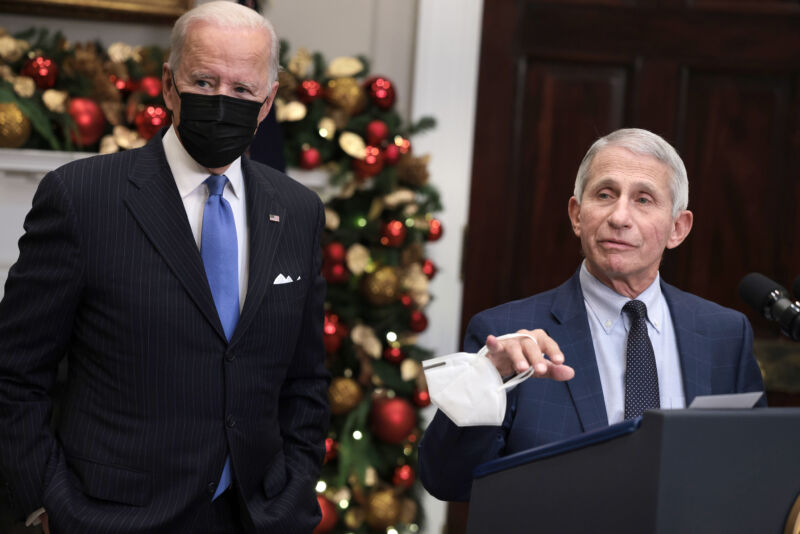US preps vaccine contingencies amid panic over poorly understood omicron

Amid global panic over the recently identified omicron coronavirus variant, US President Joe Biden on Monday urged Americans to stay calm and continue following health measures known to be highly effective at combating COVID-19—namely, masking, vaccination, and boosting.
“This variant is a cause for concern, not a cause for panic,” Biden said in remarks delivered from the White House Monday. He touted the power of current vaccines and America’s scientific prowess in being able to address the potential threat. “We’ll fight this variant with scientific and knowledgeable actions and speed—not chaos and confusion.”
Flanking Biden during the remarks was top infectious disease expert Anthony Fauci. Earlier today, Biden huddled with Dr. Fauci and the rest of the White House COVID-19 Response Team to discuss the threat of omicron. Biden reported that, so far, Fauci and the team believe that current vaccines will “provide at least some protection” against omicron—particularly against severe disease—and that booster doses “strengthen that protection significantly.”
In a separate announcement Monday, the Centers for Disease Control and Prevention strengthened its recommendations for booster shots, now saying everyone aged 18 and older should get a booster dose.
“We do not yet believe that additional measures will be needed,” Biden said in his remarks. Additionally, time-tested health measures, such as masking and physical distancing, remain effective against the spread of the virus. “Please wear your mask when you’re indoors in public settings around other people, “Biden implored. “It protects you. It protects those around you.”
Preparation vs. panic
Still, Biden said his administration is making plans if vaccines and boosters do fail, in which case the world will need updated vaccines and/or booster shots designed specifically to fight omicron. “My team is already working with officials at Pfizer, Moderna, and Johnson & Johnson to develop contingency plans for vaccines or boosters if needed. And I will also direct the FDA and the CDC to use the fastest process available—without cutting any corners for safety—to get such vaccines approved and on the market—if needed.”
The president’s remarks reflect the difficult messaging around the discovery and response to omicron, which has concerning features but little data to solidify those concerns.
The variant earned international attention last week after officials in South Africa reported detecting omicron to the World Health Organization on November 24. The first known infection with the variant was identified from a sample taken on November 9. Omicron was also detected in neighboring Botswana from clinical samples collected November 11.
Since those early detections, cases of COVID-19 in South Africa have risen sharply, from around 300 cases per day to around 3,000. And the share of cases from omicron have increased rapidly. In a widely cited tweet on November 25, Tulio de Oliveira, the director of the Centre for Epidemic Response and innovation in South Africa, reported that the omicron variant already accounted for 75 percent of SARS-CoV-2 genomes sequenced in the country. In an emergency meeting November 26, the WHO designated omicron a “variant of concern” based on its rapid rise—as well as its mutations.
Mutations and vaccinations
The most concerning aspect of omicron is the sheer number of mutations it carries compared with previous SARS-CoV-2 viruses. According to genetic sequencing data so far, omicron carries 45 to 52 changes in its genetic blueprints—and 26 to 32 of those mutations occur in the virus’ critical spike protein. The spike protein is what the virus uses to enter human cells, and it’s also the prime target of our immune responses, whether those responses are derived from past infections or vaccines. In contrast to omicron, the delta variant became the globally dominant variant with nine mutations in its spike protein.
Some of the mutations found in omicron’s spike have been seen in other variants, including delta, and some mutations are known to foil potent antibodies that would otherwise fight off the virus. Still other mutations have never been seen before. Scientists do not yet know what the totality of the mutations’ effects will be on our protective immune responses, whether they be from vaccination, past infection, or both. And experts expect it will take several weeks to get answers. Those answers on possible “immune escape” will likely come from experiments pitting the new variant against vaccine-derived and infection-derived antibodies in labs, as well real-world data on vaccine effectiveness and reinfections.
In the meantime, experts tend to agree with the Biden administration that vaccine effectiveness will likely take some sort of hit but won’t drop to zero. While omicron’s lineup of mutations does suggest that antibody responses will be weakened, they are unlikely to fail completely. Additionally, our immune systems also rely on cell-based responses to fight off infection.
“Despite uncertainties, it is reasonable to assume that currently available vaccines offer some protection against severe disease and death,” the WHO concluded in a technical guidance on omicron, released November 28.
https://arstechnica.com/?p=1816834